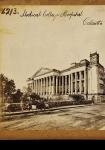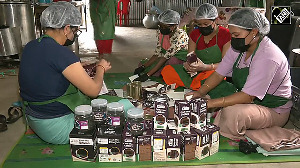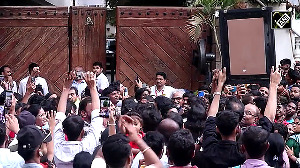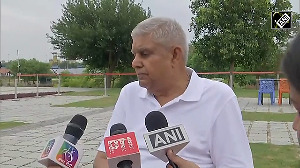'A dangerous and false binary is now surfacing in Indian political discourse, which must be firmly rejected.'
'It is that we have to choose between freedom and development.'
'For us freedom is neither merely an instrument for development nor to be subordinated to development.'
'It is, as our founding fathers proclaimed early in our freedom struggle, 'our birthright' on which we shall never compromise.'
'Growth, wealth and development are fruits of democracy, not substitutes.'
Dr Manmohan Singh's thoughts on democracy: A Must Read!
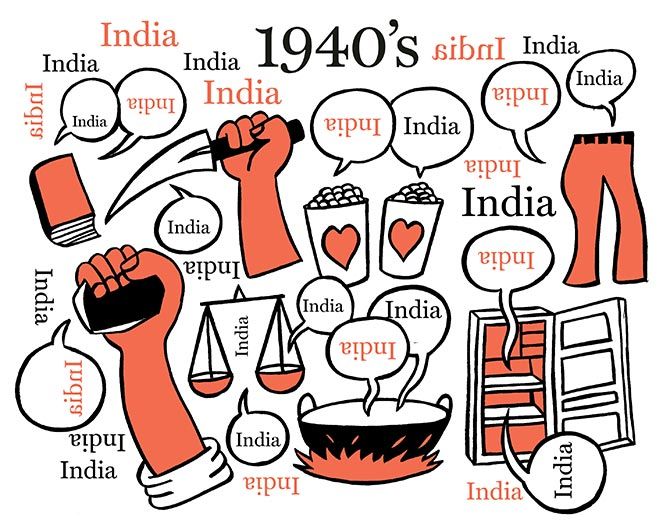
All Illustrations: Uttam Ghosh/Rediff.com
Prof Arun K Grover, vice chancellor, Panjab University, Professor Upinder Sawhney, chairperson, department of economics, Professor Meenakshi Malhotra, dean, members of faculty, my dear students.
I am very grateful to Dr Arun Grover and Professor Upinder Sawhney for inviting me to deliver this lecture which commemorates the memory of Dr S B Rangnekar who along with Dr K K Dewett was the founder of the department of economics of the Panjab University after the Partition of India in 1947.
The department of economics in those days was located at Hoshiarpur along with many other university departments.
I joined the department of economics as an MA student in 1952. This was the first year of adoption of the new MA syllabus in whose preparation Dr Rangnekar played a pioneering role. He was a great teacher who inspired me to go to Cambridge after my MA examination.
On return from Cambridge, I joined the department of economics as a senior lecturer. Soon thereafter, the department of economics moved to Chandigarh and I had the privilege of working in the department with Dr Rangnekar as its head.
Dr Rangnekar and his wife treated me and my wife as a member of their family. That was the happiest period of my life and I recall it with gratitude to Dr Rangnekar.
An improbable tryst of an ancient people with their destiny, long suppressed has produced, over the last seven decades, an impossible triumph -- the flowering of the world's greatest democracy in a land rife with irreconcilable differences and unending conflicts; poverty and starvation, illiteracy and innumeracy; feudalism and serfdom, caste and hierarchy; suppression and exploitation; a democracy born in swirling, angry and turbulent rivers of hateful blood associated with partition of the country; a land that was lost in deep dementia about its great civilisational heritage of love, compassion and non-violence.
Seventy years ago, the world gave Indian democracy no chance for success. Our common people have proved the world wrong.
Democracy is more than a system of government. It is an ideology about how human beings ought to treat each other.
Democracy is based on a stubborn insistence that every human being should have an equal voice in the formation and operation of arrangements of governance -- based only on his or her humanity, irrespective of power and privilege, status and education, gender, caste or religion, language or culture.
It manifests itself in every dimension of the ordinary course of human life, in ordinary, daily human transactions.
Equality, freedom and fraternity are the three values that constitute the life breath of democracy -- its very essence.
Anniversaries are more than mere opportunities for celebration. They are also moments of reflection and introspection, for recommitment and rededication to basic goals and values.
I wish to take this opportunity to do more than engage in highlighting our achievements in economic, social and political spheres -- impressive though our achievements have been in this regard.
Sustained and equitable economic growth and high levels of employments are absolutely necessary for orderly functioning of any modern economy.
But I shall not dwell on this aspect. I propose, instead, to reflect very briefly on some vital pillars of democracy that need to be constantly secured and strengthened so that our democracy continues to grow from strength to strength in the decades and centuries that lie ahead of us: Equality, freedom, fraternity and our electoral system.
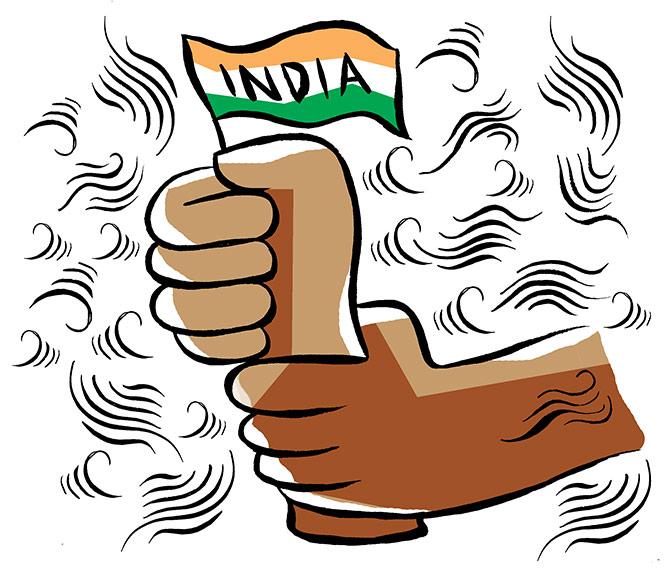
Equality
Equality is the keystone of democracy. And it is one of the greatest challenges faced by India in building our democracy because of the persistence in our society of feudal, hierarchical ideas of inequality based on caste, class and gender.
Speaking on November 25, 1949, to the Constituent Assembly about his concerns on the challenge of transforming India into a society based on equality, Dr B R Ambedkar said:
'In politics we will have equality and in social and economic life we will have inequality. In politics we will be recognising the principle of one-man one vote and one vote one value.'
'In our social and economic life, we shall, by reason of our social and economic structure, continue to deny the principle of one-man one value.'
'How long shall we continue to live this life of contradictions? How long shall we continue to deny equality in our social and economic life?'
'If we continue to deny it for long, we will do so only by putting our political democracy in peril.'
'We must remove this contradiction at the earliest possible moment or else those who suffer from inequality will blow up the structure of political democracy which this Assembly has so laboriously built up.'
Prime Minister Jawaharlal Nehru warned in 1952 in one of his letters to his chief ministers, 'If poverty and low standards continue then democracy for all its fine institutions and ideals, ceases to be a liberating force.'
The strong commitment of the Republic to political equality has had its collateral impact on questioning the persistence of social and economic inequality.
The principle of one-person one-vote has put unprecedented political power into the hands of a hitherto marginalised 90% of India.
They have demanded and secured policies, including for affirmative action, that have reduced disparities and have created opportunities for upward social and economic mobility for traditionally discriminated communities.
Development planning, and the Planning Commission, were designed to ensure that while the economy grew, inequality did not grow.
With the abolition of the Planning Commission, fresh efforts have to be made to keep inequalities under control.
The economic liberalisation that I was associated with in 1991-1996 and 2004-2014 was, above all, a process of opening up new opportunities for people born without social and economic privilege.
This was for me the guiding vision behind our economic reforms.
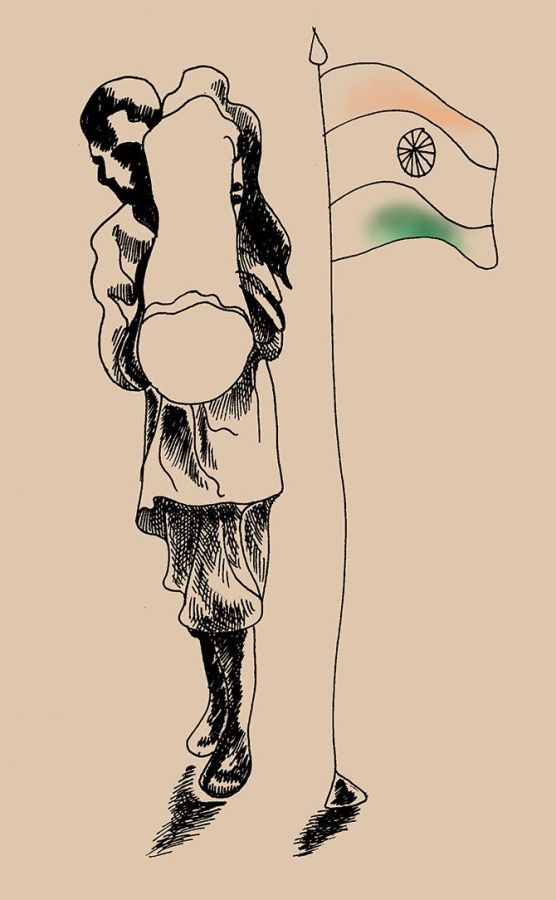
While economic growth remains a high priority for the country, there is now a growing concern that the concomitant commitment to ensuring that disparities and inequality do not grow is weakening.
This can be a serious potential threat to our democracy.
Economists and development experts worldwide, including in India, are today emphasising the grave danger to sustained growth from growing inequality.
They point out that economic inequality and exclusion are threats not only to economic and social well being, but also to a cohesive functioning of the polity as a whole.
It is vitally important for us in India to maintain strong focus on containing the growth of economic inequality, and work actively to reduce it.
A range of economic and social policy measures are available to us.
What is required is stronger social and political reawakening to the principle of equality -- social, economic and political -- for the sake of equality and as a mark of our commitment to democracy.
In the short term, pro-equality policies may make growth more expensive, but the growing inequality is, in the long term, a far greater danger to economic well being and sustained growth.
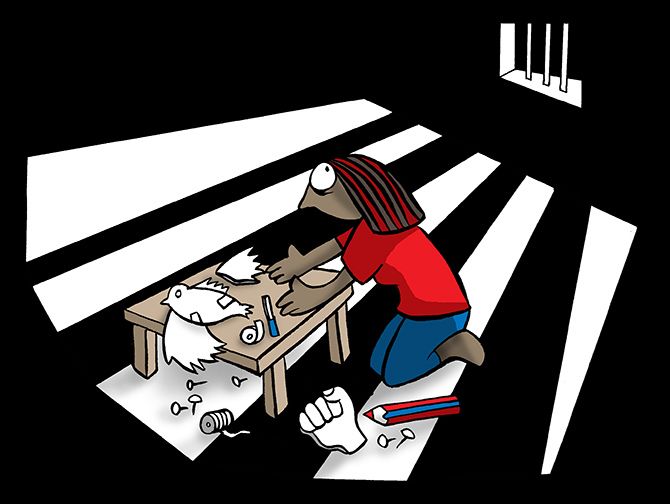
Freedom
As much as equality, freedom is a pre-requisite for democracy.
The freedom of a country is not the freedom of its government. It is the freedom of people, which in turn, is not the freedom only of its privileged and powerful, but the freedom of every Indian.
Freedom is the freedom to question, the freedom to express one's views, howsoever troubling they may be for others.
The only constraint to freedom must be the freedom of others -- in other words, the freedom of one person or a group should not be used to constrain the freedom of other individuals or groups.
Without a firm commitment to this idea of freedom for which many of our forefathers made tremendous sacrifices, our democracy will not survive.
An integral and central component of our freedom is the independence of India.
Dr Ambedkar said, 'It is not that India was never an independent country. The point is that she once lost the independence she had. Will she lose it a second time?'
'Will Indians place the country above their creed or will they place creed above country? I do not know.'
'But this much is certain that if the parties place creed above country, our independence will be put in jeopardy a second time and probably be lost forever.'
'This eventuality we must all resolutely guard against. We must be determined to defend our independence with the last drop of our blood.'
The independence of a country is a collective expression of the independence and freedom of its individual citizens.
The loss of the independence of India means that the power to determine the policies of the country has been transferred outside our shores, away from our people.
There can be no democracy without national independence. Nor can we be independent without democracy.
We must preserve strategic autonomy in decision making processes and resist the temptation of rich rewards gained by becoming a tool in the great games of big powers in the pursuit of their imperial ambitions.
We need to rebuild our commitment to maintaining India's freedom and independence, based on individual freedom and independence of every Indian citizen.
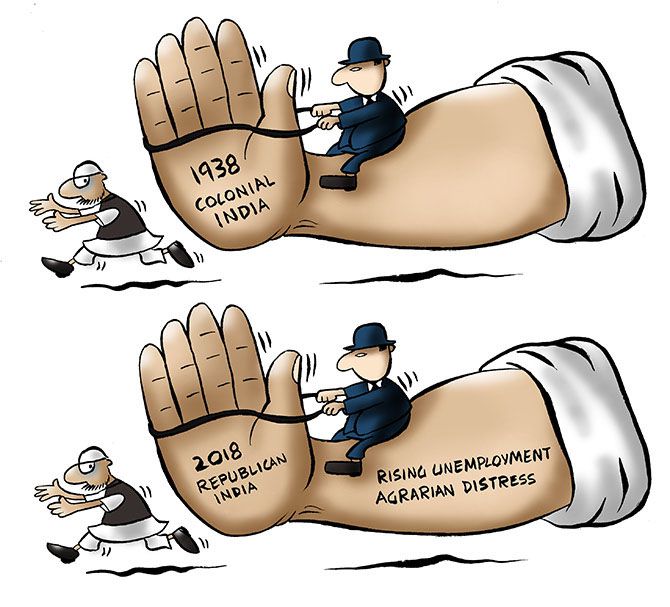
A dangerous and false binary is now surfacing in Indian political discourse, which must be firmly rejected.
It is that we have to choose between freedom and development. It is not a new binary.
The argument was put to Mahatma Gandhi, the Father of our Nation, that good governance and development are better than swaraj.
The argument was also widely advanced by colonial and pro-colonial forces that India was not ready for freedom, and that continued British raj would be better for us for our development.
The choice of the people of India then was, and still is, clear and unambiguous. We will be free and independent.
For us freedom is neither merely an instrument for development nor to be subordinated to development.
It is, as our founding fathers proclaimed early in our freedom struggle, 'our birthright' on which we shall never compromise.
Growth, wealth and development are fruits of democracy, not substitutes.
Fraternity
Democracy is as inseparable from fraternity as is equality and freedom.
Only a fraternal people can maintain a democracy. And, conversely, only a democratic nation can maintain fraternity.
Fraternity is based, as powerfully and eloquently stated in the Preamble of our Constitution, on the dignity of the individual and the unity and integrity of the nation.
I need not dwell long on the current deep concern that attempts are being made to divide the Indian people on the basis of religion and caste, language and culture.
Atrocities against minorities and Dalits are increasing.
If unchecked, these tendencies can only harm our democracy.
As a people, we must strongly reject divisive policies and politics.
India needs no lessons in the importance of fraternity.
Who can ever forget the epic tragedy of our own history -- when at the time of Partition in 1947 the ancient fabric of our deep rooted fraternity -- woven from sacred threads of love and affection seasoned over centuries -- was sought to be deliberately torn up and destroyed?
I bear personal witness to its unspeakable consequences. Hatred should never be allowed to enter our shores ever again.
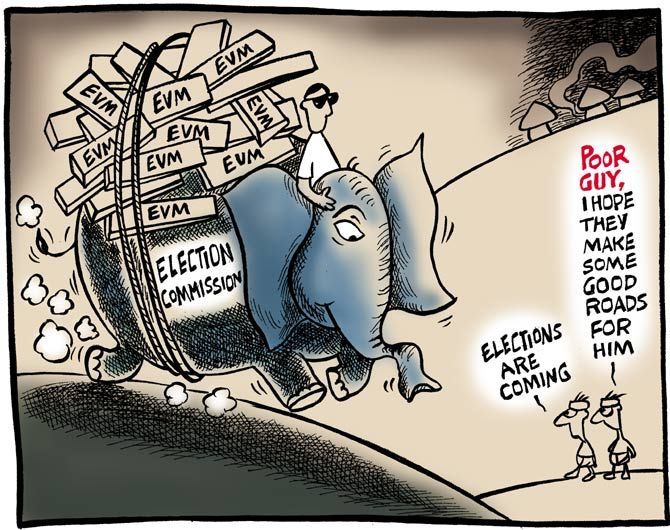
Electoral system
We are all most proud of our democratic electoral system in which ruling parties have been defeated and power has been transferred peacefully.
This is a rare success in today's world.
Our electoral system has succeeded against great odds. It has destroyed feudal systems of government.
It has opened up opportunities for the aam aadmi without any social, economic or political privilege whatsoever by birth to occupy the highest positions of power.
There is, however, today widespread concern that our electoral system is being undermined by money power and muscle power.
The faith of people in democratic elections as the best system to select a government that would govern in the common interest is today being eroded -- as much by a sustained campaign to attack democratic institutions and elected representatives as by the increasing political corruption and the capture of political parties and elected office by vested interests.
Electoral reforms to cleanse elections of money and muscle power and to maintain the integrity of elected officials are another vital area for securing and strengthening of our democracy.
Like democratic political parties, the media and the judiciary also need to be strong guardians of the public weal.
Renew our commitment to democracy
Dr Ambedkar once worried that the day may come when people may prefer government for the people to government by and of the people. He saw that as a great danger.
On this 70th anniversary, we must ensure that we do not fall into the trap of choosing government for the people over government by and of the people.
We need to ask ourselves whether we are losing patience with democracy and turning to more authoritarian alternatives that may well yield superior short-term results, but in the long term will end up destroying our country and all the achievements of the last 70 years.
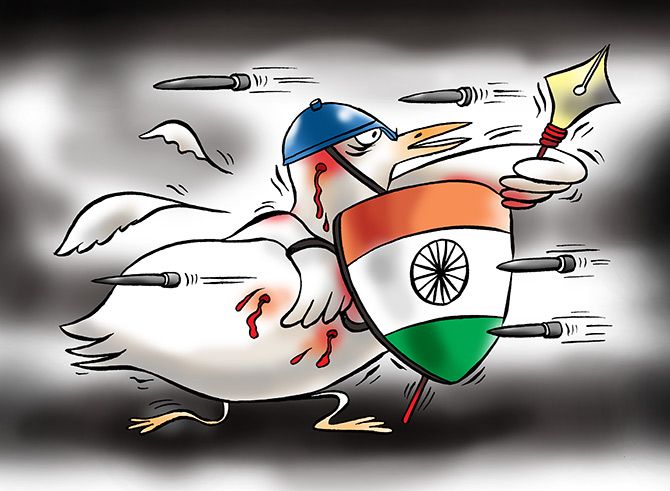
Governance is complex. It is messy. It is slow. Its benefits are long term. It requires great patience.
Above all, democracy is a system in which people without privilege have a decisive voice in governance.
If this is lost, democracy becomes meaningless.
Democracy requires not only that all of us must get involved, but that we must each ensure that everyone has an equal voice.
We must take a long-term view in which we always keep the interests of future generations as our highest concern.
That wisdom, that sagacity, that capacity for the long view is our true civilisational heritage.
Finally, as we celebrate this seventieth year of our independence I am extremely optimistic about our future as a nation and ask that we continue our journey on the path of democracy by imbibing these words from Pandit Nehru:
'I hope that we shall look into the future with a stout heart and with confidence in ourselves.'
Let us all join together, across all our differences, and renew our pledge to build a nation that would make not just our founding fathers, but generations of Indians yet to come, very proud.
Dr Manmohan Singh, the former prime minister of India, delivered the first S B Rangnekar Memorial Oration at Panjab University, April 11, 2018.





